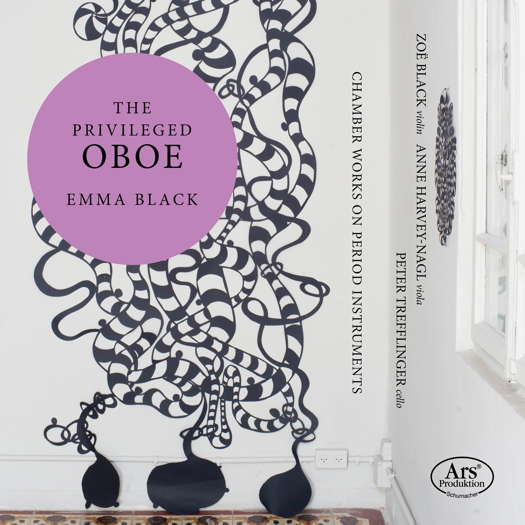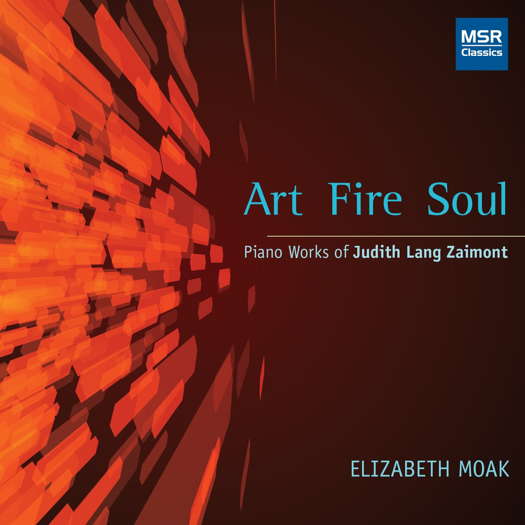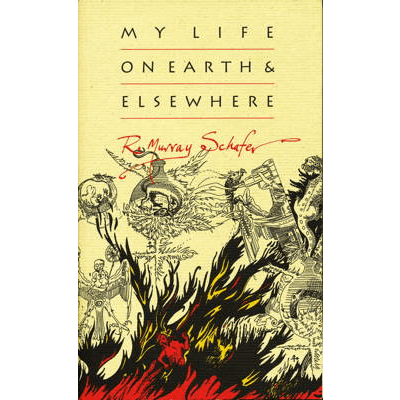- Phyllis Curtin
- Munich Philharmonic
- Phasma-Music
- Mark Isaacs
- Connecticut
- Einojuhani Rautavaara
- Matt Jordan
- Lloyd's Choir

Spaciousness and Openness
GEOFF PEARCE heartily recommends chamber music with oboe on period instruments
'All the performers are very fine, but I am really amazed at the beauty of Emma Black's playing.'
As an oboist, I always look out for recordings that interest me, and I generally do love hearing instruments that are reconstructed from instrument of the period the music was written for. I have heard a few recordings featuring Emma Black, including an earlier album with the same title where she is playing Baroque works. It is a pity that neither the previous album nor this one have a digital booklet accompanying them and I hope that this is not a trend, as these booklets and notes can help a listener a great deal, especially if the work is not well known.
I Am familiar with all of the works on this recording but the Mozart K 285 quartet is a flute quartet and it would be interesting to know the background to its transcription here.
J C Bach composed nine quartets featuring the flute that are in two movements, and if this one was originally conceived featuring the oboe, it is likely that the composer's friend J C Fischer who also lived and worked in London would have been the inspiration. It is in B flat major and also in two movements, an Allegro and a Rondo (Tempo di minuetto). I have heard this quartet performed with modern instruments, but it does not get recorded all that often.
The first movement is a warm hearted work and is one of my personal favourites. The recording I have of it features a star studded group including Ray Still and this new recording compares very well with that, Emma Black's sound on the classical oboe is lovely, her intonation secure, even with some of the cross fingerings, as this instrument would have only had three keys, and her technique is admirable as is her phrasing. The other three instruments are in fine balance, and the balance is very pleasing. There is a spaciousness and openness to the sound over all that is often lacking in recordings with modern instruments.
Listen — J C Bach: Allegro (Quartet in B flat)
(ARS 38596 track 1, 5:44-6:43) ℗ 2024 Ars Produktion :
The second movement is elegant and there is a section of this movement in G minor where the viola has it's moment in the sun.
Listen — J C Bach: Rondeax (Quartet in B flat)
(ARS 38596 track 2, 2:16-2:56) ℗ 2024 Ars Produktion :
The next work is the three movement Quartet in F major for oboe, violin viola and cello K 370 by Mozart. It also is featured in the other album I mentioned earlier, but my earliest exposure to it was on some 78 recordings I had featuring Leon Goossens. (He recorded it twice, firstly in the mid 1920s and then a little bit later.)
It is the best known of all the works for oboe quartet, and was remarkable at the time because it featured the full range of the instrument at that time, going up to top F. Mozart wrote this work in 1781 for Friedrich Ramm as he admired his playing a great deal. The first movement is sprightly and delightful and the oboe writing here is in a concertante style, then in the adagio, the oboe too is featured more in this style with the other instruments occupy an accompanying role.
Listen — Mozart: Adagio (Quartet in F, K 370)
(ARS 38596 track 4, 2:22-3:02) ℗ 2024 Ars Produktion :
In the Rondo however the roles are more mixed and there is a remarkable section where the oboe changes into quadruple time where the strings maintain the 6/8 of the rest of the movement. The writing for the oboe is quite virtuosic in this movement, requires great flexibility of fingers and tongue, and employs some quite tricky passages.
Listen — Mozart: Rondeau (Quartet in F, K 370)
(ARS 38596 track 5, 3:29-4:13) ℗ 2024 Ars Produktion :
This is the first recording I have heard of this work on period instruments, and I am quite delighted with the results. The spaciousness, ease and balance of the ensemble really set it apart. All the performers are very fine, but I am really amazed at the beauty of Emma Black's playing.
J B Vaňhal was a friend of both Haydn and Mozart, and they sometimes played chamber music together along with Dittersdorf. He composed a series of quartets around 1770, and this one, Op 7 No 1, appears to have had the oboe specifically in mind (as they all suggested flute or oboe, but this first one is perhaps the most oboistic and is usually performed on the oboe). It is in four movements, and throughout, the oboe and violin share most of the melodic interest equally. This is beautifully elegant music and again, the ensemble and balance are outstanding.
Listen — Vaňhal: Presto (Quartet in F, Op 7 No 1)
(ARS 38596 track 9, 4:08-4:49) ℗ 2024 Ars Produktion :
Mozart's Quartet in C major, K 285, is next. It was originally the first of three flute quartets written in Mannheim and first mentioned in a letter to Mozart's father in 1777. It is in three movements and was originally written in D major. I think it must be quite taxing to play, as the writing lies in the upper range of the instrument. (Perhaps this is one reason why it is a tone lower than the original.) I am not sure what prompted this transcription, but it works well on the oboe. It is charming music, and like much of Mozart's chamber music, it is full of light and grace.
Listen — Mozart: Rondeau Allegretto (Quartet in C, K 285)
(ARS 38596 track 12, 0:01-0:42) ℗ 2024 Ars Produktion :
The last work on this generous disc is the Mozart Adagio in F major, K 580a. This was written around 1789 and exists in a few different arrangements and versions. I believe the original may have been written for clarinet and three basset clarinets. I first heard it in the arrangement presented here and have loved it since I was a boy. It is a joy to play and it is played in G major here. I think this is the first time I have heard a classical cor anglais, and it is a little different from the modern instrument in sound, but Emma Black and ensemble create real magic to end this disc on a peaceful note.
Listen — Mozart: Adagio in F, K 580a
(ARS 38596 track 13, 3:15-4:00) ℗ 2024 Ars Produktion :
This really is a marvellous disc and one that I would heartily recommend. It is a pity that there are no accompanying notes but a quick search online will reveal a good amount of information about both the works and the artists.
Copyright © 9 September 2024
Geoff Pearce,
Sydney, Australia





